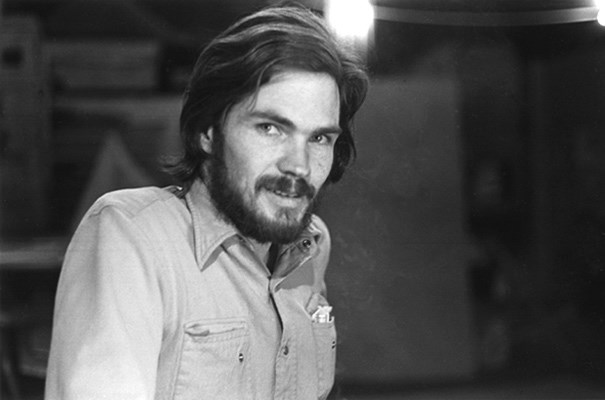- BackBone: Vancouver Experimental Cinema from 1967-1981 screening at Pacific Cinémathèque May 4 and 12 as part of the DOXA Documentary Film Festival. For a complete schedule go to doxafestival.ca.
FUELED by peyote and punk rock they set about shooting films and assassinating the conventions of filmmaking.
While other directors focused on narrative, this group of West Coast troublemakers, innocents, anarchists and inveterate tinkerers tried to create something never before seen in cinema.
They didn't make movies so much as they sculpted film itself, looping it, scratching it, and chemically burning it in an effort to test the limits of the medium and forge a new type of movies without stories. Squares were not invited.
The work of Vancouver's experimental filmmakers is chronicled in Backbone: Vancouver Experimental Cinema from 1967-1981, directed by Richard Martin.
As a child of the 1970s, Martin grew up with storytellers like Francis Ford Coppola and Robert Altman.
Many directors of the era were intrigued with taking apart genre pictures. The gangster movie became The Godfather, the western turned bleak with McCabe & Mrs. Miller.
But while iconoclasts like Coppola and Altman were deconstructing film genres, a cinematic alchemist named David Rimmer was making a stir by deconstructing film.
"An art teacher actually said: 'If you're interested in film, I hear there's this guy who makes these whacky films in town, you should go see 'em,'" Martin recalls.
He set out for the Vancouver Art Gallery where Rimmer's work was waiting.
"It was like, 'Whoah, there's a whole other way of making movies, too.' So it was quite an epiphany for me back at the tender age of 14," Martin says.
Rimmer directed the influential experimental short film Variations on a Cellophane Wrapper, featuring shifting colours layered over an image of a woman unfurling a cellophane wrapper in what seems like an endless loop.
What started as a lone experimenter evolved into an energetic scene.
Looking back on the era, Martin sees a history that has since been neglected.
"They kind of go along with a history of cinema that isn't acknowledged as much. There's all kinds of things that were going on in experimental world that kind of was assimilated into mainstream, especially into the '80s, especially into rock videos and commercials," he says.
"For a lot of younger artists and filmmakers, you don't see that history layered in."
It's a pattern that has emerged since surrealists attempted to etch their dreams onto film in the 1940s, according to Martin.
"There's been crazy people doing crazy things with film that always eventually worked their way into the mainstream whether it's editing styles or composition or subject matter even," he says.
As the director of Air Bud: Golden Receiver, Martin may seem like an odd choice to helm a documentary on experimental cinema. However, Martin made his first mark in movies with the experimental short Diminished, described by film and culture critic Gene Youngblood as a "delicately structured nonverbal poem about loss."
Film degrades over time, a process that accelerates when a movie isn't paired with a projector on a regular basis. While the experimental films of Martin's youth may be treasured, the films themselves were neglected.
"I remembered some of these films. I was helping out at a place called Moving Images Distribution in town - they distribute shorts and that kind of thing - and so I was helping move some stuff around and I went into a room that had all these tins of 16 millimetre film and I looked at them and I remembered some of these films even though I hadn't seen them in 35 years. They were like old friends."
Faced with the cans, many of which hadn't been transferred to digital, Martin considered assembling the movies into a compilation, but the idea wouldn't seem to stand still.
"Let's do some commentary. Well, let's shoot some video commentary. Then you start talking to the people and now you're talking about Vancouver and the '70s and art movements. You start to get into it and it just kept on going," Martin says.
Martin collaborated with camera operator William Fritzberg to make a lean, inexpensive film.
"It's not like we were making money. It was made for a few dollars and the kindness of many people," Martin says.
He ended up with nearly 20 hours of interviews, featuring directors discussing censorship, stories, and the blessing of accidents.
Martin is already planning a DVD edition to give a second life to the great moments that fell to the cutting room floor.
One of those moments includes filmmaker Tom Braidwood discussing his transition from working as assistant director on The X-Files to appearing on screen as one of the lone gunmen.
The documentary is meant to evoke the experimental films somewhat, although Martin says he restrained himself.
"We've kind of pulled back on that a little bit," he says. "I was having way too much fun."
The film is scheduled to have its first public screening in a theatre that will include the directors chronicled in the film, all of whom will be seeing the picture for the first time, according to Martin.
But while the movie is a tribute to a bygone era, Martin is hopeful young film buffs will delve into that often neglected history.
"I guess I've made more of a personal statement, a personal film about the genre and about those people who basically were my heroes back in the day," he says. "Taking in all that history of cinematic development I think just does nothing except just make it all the more wonderful and more alive. So I'm hoping that it goes to a lot of young filmmakers and artists."



